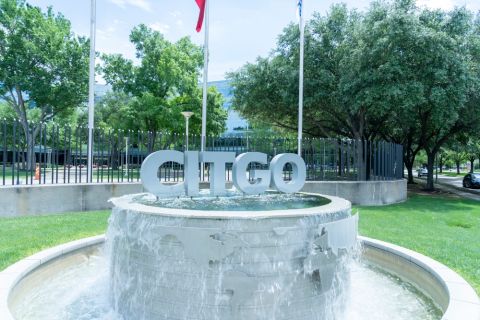San Leon Energy Plc (SLE), the natural- gas explorer backed by billionaire George Soros and Blackrock Inc. (BLK), expects its Polish shale licenses to be more profitable than U.S. deposits, the company's exploration director said.
San Leon, which became one of the leading shale gas explorers in Poland after buying Realm Energy International Corp. (RLM) for $142 million last month, seeks to profit either through so-called farm-outs with a cash component or asset sales once it develops its fields and proves they can produce gas, John Buggenhagen said in an interview in Warsaw.
Shale gas, unlocked from rocks by blasting them with sand, chemicals and water, has boosted U.S. production and delivered the lowest prices in almost a decade. Companies including ExxonMobil Corp. (XOM) and Chevron Corp. (CVX) seek to emulate the U.S. boom in Poland, Europe's biggest holder of shale.
"If you're getting $4 for your gas in the U.S., here you're getting $8, meaning I can produce half as much gas for the same profit," Buggenhagen said.
San Leon rose 1.3 percent to 20.25 pence at 2:46 p.m. in London, valuing it at 167 million pounds ($262 million).
Dublin-based San Leon has 14 licenses and 1.7 million acres of land in the eastern European country to explore for shale gas and conventional hydrocarbons, according to a presentation on its website. Poland has granted 101 licenses, with eight wells completed out of a mandatory 124. Test production has started on two wells.
U.S. Example
"If you look at what's going on in North America, I mean that people are paying $10, $20, $30 an acre, and selling it for $10,000, $20,000, $30,000 an acre, that’s the kind of return that we’re looking for." Buggenhagen said. "We would like to use our existing capital to start exploring those Realm concessions on our own, as opposed to giving away acreage through farm-outs."
Last year, the company signed a farm-out agreement with Talisman Energy Inc. (TLM), under which the Canadian gas explorer will drill one well on each of San Leon's concessions in the Baltic basin in northern Poland in exchange for 30% stakes in the licenses. Talisman has an option to increase its holdings to 60% if it drills an additional well on each license.
San Leon was approached by three "significant oil and gas companies" and may consider more farm-outs after upcoming drillings, Buggenhagen said.
"If I come and drill the well that costs me $4 million to $5 million and if I’ve increased the value of that block 10- fold, then the value of my farm-out is that much more," he said.
Production Start
Poland may sit atop about 5.2 trillion cubic meters of shale gas, according to the U.S. Energy Information Administration. Commercial production can start in three to five years, helped by the relatively high price of Russian gas, Buggenhagen said.
The country buys some 60% of its gas under a long- term contract from Russia. In the second quarter the country was paying more than $400 a 1,000 cubic meters of Russian gas, according to Polish Deputy Prime Minister Waldemar Pawlak. That’s about three times today's gas price for October delivery on the New York Mercantile Exchange.
While Poland's almost complete reliance on coal as fuel for power generation may help boost shale production given the European Union's push to lower carbon-dioxide emissions, the country should be cautious in increasing royalties for oil and gas producers, Buggenhagen said.
"What we're struggling to know is how is the Polish government going to respond to success, in terms of changing royalties and income taxes," he said. "You see that everywhere in the world -- the greed factor -- how much greed we will see over the next three to five years."
Production Fees
Last month, Poland's largest opposition Law and Justice party presented a draft law calling for output fees to be at least 40% of the value of the deposit. While the government argues mining fees should not be set before gas deposits are proven, in June Pawlak said the country saw Norway and its sovereign wealth fund as a model to benefit from shale gas production.
"Royalties are less than 1% now, so very low," Buggenhagen said. "They will go up, for sure, But if you raise it to 40% you're going to discourage the investment."
Recommended Reading
FTC Oks Chevron-Hess Deal, Bans John Hess from Board
2024-09-30 - Federal regulators signed off on a blockbuster tie-up between Chevron and Hess Corp. but banned CEO John Hess from sitting on the Chevron board.
Venezuela Lost Citgo, But the Battle’s Not Over Yet
2024-10-04 - Amber Energy’s $7.3 billion purchase of Citgo fell well short of analyst’s valuations. PDVSA Ad Hoc expects to appeal the decision soon in its battle to protect its claim on Citgo.
Quantum Teams Looking for Acquisitions ‘Off the Beaten Path’
2024-10-14 - Blake Webster, partner at Quantum Capital Group, said the private-equity firm’s portfolio teams are looking to buy from sellers looking for cash buyouts, though not necessarily in the usual places.
Diamondback Subsidiary Viper Closes $900MM Midland Royalty Deal
2024-10-02 - Diamondback Energy’s Viper Energy closed the last of three acquisitions from Tumbleweed Royalty, owned by Double Eagle Energy’s founders, that together totaled about $1.1 billion.
SM Energy, NOG Close $2.6 Billion in Uinta Basin Acquisitions
2024-10-02 - SM Energy and Northern Oil and Gas have closed the acquisitions of XCL Resources and Altamont Energy, adding hundreds of locations and oil cuts of 86% to 87%.





